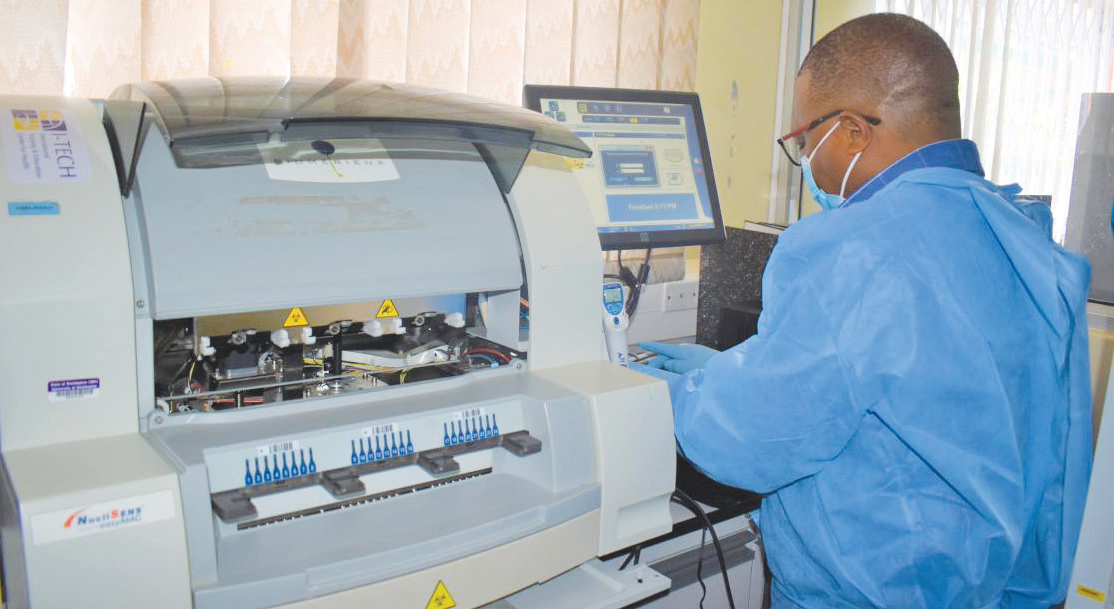The fast-changing Covid-19 pandemic has left scientists globally with no time to blink.
At the National HIV Reference Laboratory in Lilongwe, the capital city of Malawi, Dr Bernard Mvula and his team are tracking the Covid-19 virus as it changes wave after wave.
Every day, the laboratory scientists, who detected Malawi’s first Covid-19 case in April 2020, receive positive samples from all regions to isolate any emerging variants.
“Covid-19 has made scientists think faster. Before the pandemic was discovered in December 2019, science was in slumber. But the pandemic jolted us to develop tests and sequencing faster than before. Even vaccines no longer take decades in the making,” says the biomedical scientist.
Mvula became the head of the national laboratory at the Public Health Institute of Malawi in May 2016.
His team works day and night to track the spread of Covid-19. The virus has claimed over 2 600 from over 86 000 cases confirmed in the country.
“At the start of the pandemic, we used to work overnight, even during weekends and public holidays. There was no time to rest as the pandemic claimed lives,” Mvula recalls.
Since July 2021, the laboratory has been testing how the fast-spreading coronavirus is evolving. Splitting its genes and analysing results using computers, the scientists detect changes likely to affect prevention, transmission, treatment, and severity. They call the process genome sequencing.
Mvula explains: “The workload remains huge. At the start, it wasn’t easy to get samples that qualify for sequencing, but we have been sensitising other labs to collect suitable labs. We were sequencing about 50 samples a month, but now we can sequence 100 to 200 samples.
“The procedure could take five to seven days as some steps had to be done at night. Besides, we have to go as far as Mzuzu, almost 400km away, to collect the samples, which sometimes have low viral loads for sequencing.
With funding from the Government of Ireland, Unicef Malawi supported the Ministry of Health in improving Covid-19 testing. The boost included the provision of vital chemicals, training of five officers in South Africa, information technology such as four computers and software, and physical skills-sharing meetings for a better understanding of the virus’ genetic material. The support might include some international exchange visits.
“Since 2020, the Government of Ireland has provided US$ 2 183 176 to the Ministry of Health through Unicef for Covid-19 response in Malawi. The valuable support has made a direct impact on the lives of thousands of Malawians,” explains Unicef Health Specialist, Mesfin Senbete.
Mvula also adds that, “The support was timely because genome sequencing helps us understand the genetic material of the coronavirus to figure out how it has changed from the first one detected in 2019. This helps us warn the public health system to recommend necessary changes in how the nation is fighting or treating Covid-19.”
The demanding process is exciting to the scientists who churn out new science that shapes the national and global response, including vaccine experiments.
“Before the Covid-19 pandemic was confirmed in Malawi, we never thought of doing genome sequencing in the country. We had few trained scientists, but we lacked basic equipment and needed to train more personnel on the bench to do sequencing ef fect ively. We thank the government and our partners for building our capacity so that the nation can better respond to the pandemic,” he says.
As Covid-19 prevention required everyone to avoid crowded settings, some scientists learned new skills online while others went abroad to hone their vital know-how.
“The support from partners has changed how we test for Covid-19. We needed this support because the equipment, reagents, and training are expensive and not locally available,” Mvula states.
Since sequencing started amid the third wave, scientists have detected the Delta and Omicron variants.
“When we detect a variant of concern or interest, we alert the Ministry of Health so that the country can quickly step up preventive measures, treatment, and immunisation,” says Moses Chitenje, the understudy of Mvula.
Before the upgrade, the laboratory was sequencing HIV. The fine detail of the virus that causes Aids helped improve preventive measures, testing, treatment, and mass awareness.
This has proved vital in reducing Aids-related deaths that turned Malawi into a nation in mourning at the turn of the millennium. Then people were dying like flies, and funeral parlours lined the country’s streets.
The National Aids Commission reports a dramatic reduction in Aids-related deaths from 64 191 in 2005 to 12 978 in 2016.
Turning the HIV laboratory into a Covid-19 situation room personifies how the country is building on past success and proven science to combat the new pandemic.
“The main challenge is that we do not have enough technical knowledge, and we need more knowledge in bioinformatics,” says Mvula. “Besides, space is not enough, so the laboratory needs to be extended, or we have to build a new one elsewhere.”
The scientists can afford a smile despite the long struggle to split the difference between the initial virus and its mutations.
“It is too much work, but we are happy to have the novel technology that enables us to track the changes in the pandemic to alert our health system and global actors. So far, we have shared findings from 88 samples with the global community. We are glad that this innovation is saving lives.”
The post As Covid evolves, scientists split the difference appeared first on The Nation Online.
 Moni Malawi
Moni Malawi 
